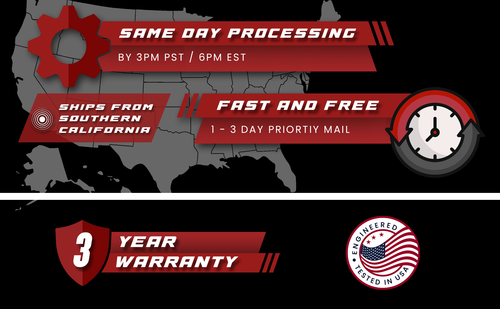Product Description
Test your Detroit Diesel 12.7L Series 60 turbo motor for boost leaks and assure your getting the most out of the turbo charger!
Get You Boost Back!
This high quality boost leak tester is designed to perform a boost leak test for your turbo charged engine.
This is an important tool that every turbo car owner needs in their arsenal of tools. It is going to keep the turbo healthy by eliminating leaks in the boost path.
Save yourself money and check your turbos pressure for leaks! Loss of power, poor miles per gallon and deteriorating performance are signs of losing boost pressure. This tester is designed specifically for your Detroit Diesel 12.7-Liter Series 60 and is made to restore your full potential of your trucks power. A turbocharger that has a boost leak for an extended period of time will fail prematurely. This important preventative maintenance check can save you a break down while hauling a load.
The turbo boost leak tester tests the complete intake system with your engine off. You can apply maximum boost pressure of 15 psi and listen for any air leaks. When applying the pressure to this tester through compressed air, it will force air in every part that the turbocharger would normally pressurize.
Design Features:
- Billet 6061 Aluminum End Cap with 1/8" NPT threaded gauge port & fitting port
- High quality silicon coupler
- Boost Gauge - Stainless Steel Shock-Proof Glycerin-filled 15 PSI Boost Gauge. The15 PSI range will give you the appropriate reading when testing your charge pipes for low, medium or high boost levels.*
- Universal Tire Schrader Valve
- (2) Stainless Steel T-Bolt Clamps with Teflon lock-nut
Common Issues:
- Faulty charge air coolers (leaking through various cracks)
- Intake Manifold cracks
- Intake manifold gasket leaks
- Turbocharger outlet pipe leak
- Charge air cooler piping
- Inspect intake grid heater for cracks
How do I know if I have a Boost Leak?? Common Symptoms are:
- P-codes, Check engine lights, system too rich
- Excessive Black smoke: (Less boost, More fuel = Un-burnt Fuel)
- Loss of power
- Loud Whistling noise
- Loud Air Leak when pulling grades
- Poor Fuel Mileage
- Typically the boost target will be lower than what is expected by the tune
- Boost onset could be erratic
- Slower than normal spool-up
What happens to the turbo charger if there is a boost leak??
Any leak will cause the turbos wheels to over-spin and result in bearing to wear out eventually causing shaft play! This happens faster with larger leaks. This conditions then allows for the turbos wheel tips to make physical contact with the turbo housing. Its over for your turbo at that point!
Simple Steps to Use the Boost Leak Tester:
- Remove the intake hose/pipe off your turbo chargers inlet
- Install the boost leak tester onto the turbo chargers inlet and secure with the T-bolt clamps
- Pressurize the boost leak tester with an air compressor and a tire inflator tool. The air compressor should be a minimum of 2 gallon volume. The larger the compressor, the more capacity you have to fill the engines charge pipes. A bike pump or electric pump will not supply enough air fast enough to fill the system
- *Caution! - When filling the system, start with a low pressure around 5 PSI. Recommended to regulate the compressor to a lower pressure and only increase if filling is too slow. The boost gauge reading indicates how much compressed air is in the charge pipes. The boost gauge allows you to read the bleed rate of charge pipes when you remove the pressure. It is normal to see pressure loss average of 1psi every second. Faster bleed rate at higher pressures and slower bleed rate at lower pressures
- Listen for leaks. Use soapy spray if necessary to identify smaller leaks.
- Fix any leaks points and then retest. Increase by 5psi up to the normal operating boost pressure.
- Go out and Boost! Enjoy the restored power from your engine!



















